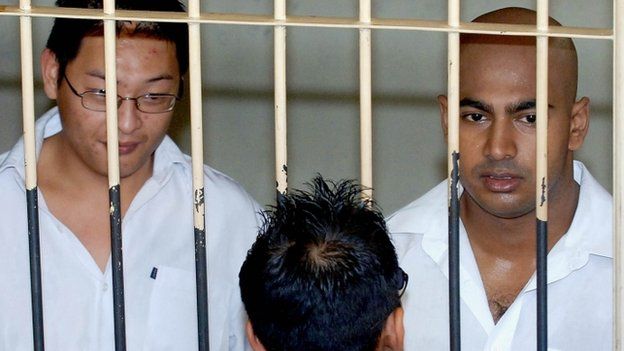Bali Nine: Indonesia condemned over death penalty
- Published

France and Australia have condemned the death penalty as executions for three of their nationals loom in Indonesia.
Earlier, Australia called on Indonesia to delay executing two convicted Australian drug traffickers until corruption claims were investigated.
Andrew Chan and Myuran Sukumaran were convicted in 2006.
The two, along six other foreigners and an Indonesian, have been formally told of their execution. A French trafficker is appealing against his conviction.
Under Indonesian law, convicts must be given 72 hours' notice of execution. This means the executions by the firing squad could be carried out as early as Tuesday.
"France and Australia share the same attachment to human rights and condemn the death penalty in all places and all circumstances," the French presidency said in a statement after a meeting between French President Francois Hollande and Australian Prime Minister Tony Abbott in Paris.
French convict Serge Atlaoui still has an appeal before the courts. France has warned of "consequences" if the execution goes ahead.
Meanwhile, Philippine President Benigno Aquino appealed to Indonesian President Joko Widodo for "humanitarian consideration" in connection with the case of a Filipina woman, Mary Jane Veloso, who is also on death row for drug-trafficking offences.
Mr Widodo's spokesman said he was "sympathetic" and was consulting the attorney general on legal issues.
Australia made last-minute pleas on behalf of the two Australian men to delay their execution until a corruption investigation into their case was complete.
But on Monday evening, Indonesia's attorney general confirmed that the nine death row convicts would be executed as planned, without giving an indication of when the executions would be likely to take place.
Attorney General HM Prasetyo told the BBC a judicial review "could not amend [a] previous court ruling" and that "foreigners do not have any legal standing for a judicial review on the Constitutional Court".
At the scene: Alice Budisatrijo, BBC News, Jakarta
The Indonesian government is determined to carry out the execution because it believes the country is facing a national emergency - it says more than 30 people die from drug abuse every day. It doesn't seem to matter to President Joko Widodo that the statistics he based that assessment on have been called into question.
And then there is domestic politics. President Jokowi, as he is known, was elected with popular support but his approval ratings have plummeted in just six months in office.
While Indonesia's death penalty has been widely criticised abroad, most Indonesians don't have a problem with the government executing drug convicts and murderers, as the law currently allows. Many people are even calling for an expansion of the law, to allow death sentences for corruption convictions.
At this point there doesn't seem to be any political will to do that, but if the government calls off the execution of drug traffickers, particularly foreigners, it will have serious political consequences in Indonesia.
'Dismayed'
Australian Foreign Minister Julie Bishop said the two Australians should not be executed while legal issues remained.
"I should point out that Mr Chan and Mr Sukumaran's lawyers are pursuing action before the Constitutional Court in Indonesia," she told Australia's ABC News.
Ms Bishop also said she was "profoundly dismayed" by the 72-hour execution notice.
Claims that the Indonesian judges in the trial had asked for bribes for lighter sentences first surfaced earlier this year.
One of the judges involved in the case denied there had been political interference or negotiations about bribes.
"I can assure you there was none," the judge told Fairfax Media. "We protected ourselves from everybody. It was purely our decision."
The BBC looks at the prison which has been called 'the Alcatraz of Indonesia', where condemned prisoners are executed by firing squad
Chan and Sukumaran, along with seven other Australians, were arrested in Bali in 2005 for trying to smuggle more than 18lb (8.3kg) of heroin from Indonesia to Australia.
The pair were later found to be the ringleaders of the group and sentenced to death.
Australia's top politicians have been actively campaigning for clemency for the two.
The other seven members of the "Bali Nine" are currently serving either life or 20 years in prison.
Indonesia has some of the toughest drug laws in the world and ended a four-year moratorium on executions in 2013.
- Published4 March 2015
- Published5 March 2015
- Published29 April 2015
- Published8 February 2015
- Published12 March 2015